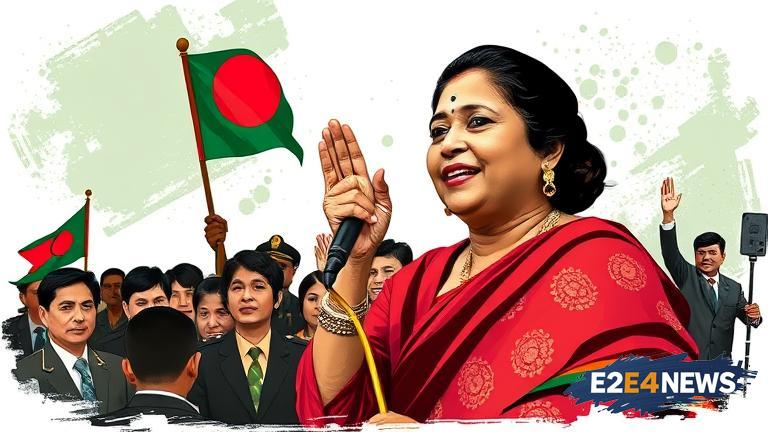It has been one year since Sheikh Hasina, the former Prime Minister of Bangladesh, fell from power, and the country is still reeling from the aftermath. Thousands of people gathered in the capital city of Dhaka to mark the occasion, with many calling for reforms and an end to corruption. The protests were largely peaceful, but there were reports of clashes between police and demonstrators. The anniversary comes at a time of great uncertainty for Bangladesh, with the country struggling to come to terms with its past and forge a new future. Hasina’s fall from power was seen as a significant blow to democracy in the country, and many are still waiting to see if the current government will be able to restore stability and prosperity. The protests were organized by a coalition of opposition parties, who are demanding that the government take action to address the country’s many problems. These include high levels of corruption, poverty, and inequality, as well as a lack of access to basic services such as healthcare and education. The government has promised to take steps to address these issues, but many are skeptical about its ability to deliver. The anniversary of Hasina’s fall from power is a reminder that the country still has a long way to go in terms of achieving true democracy and stability. Despite the challenges, many Bangladeshis remain optimistic about the future, and are calling for greater transparency and accountability from their leaders. The international community is also watching the situation in Bangladesh closely, with many calling for the government to respect human rights and the rule of law. The United States, the European Union, and other countries have all expressed concerns about the situation in Bangladesh, and have urged the government to take steps to address the country’s many problems. The anniversary of Hasina’s fall from power is a significant milestone in the country’s history, and it remains to be seen how the government will respond to the challenges ahead. In the meantime, the people of Bangladesh will continue to demand greater accountability and transparency from their leaders, and will push for reforms that will help to build a more just and equitable society. The country’s future is uncertain, but one thing is clear: the people of Bangladesh will not give up in their struggle for democracy and human rights. The government must listen to their demands and take action to address the country’s many problems. The international community must also continue to pressure the government to respect human rights and the rule of law. Only through a combination of domestic and international pressure can Bangladesh hope to achieve true democracy and stability. The anniversary of Hasina’s fall from power is a reminder that the struggle for democracy and human rights is ongoing, and that the people of Bangladesh will continue to fight for their rights. The government must take steps to address the country’s many problems, and the international community must continue to support the people of Bangladesh in their struggle for democracy and human rights. The future of Bangladesh is uncertain, but one thing is clear: the people will not give up in their struggle for a better future. The government must listen to their demands and take action to address the country’s many problems. The country’s history is marked by periods of turmoil and instability, but the people of Bangladesh are resilient and determined to build a better future. The anniversary of Hasina’s fall from power is a significant milestone in the country’s history, and it remains to be seen how the government will respond to the challenges ahead. The people of Bangladesh will continue to demand greater accountability and transparency from their leaders, and will push for reforms that will help to build a more just and equitable society. The government must take steps to address the country’s many problems, and the international community must continue to support the people of Bangladesh in their struggle for democracy and human rights.





